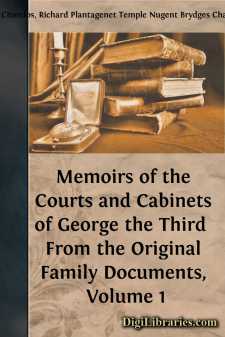Categories
- Antiques & Collectibles 13
- Architecture 36
- Art 48
- Bibles 22
- Biography & Autobiography 813
- Body, Mind & Spirit 142
- Business & Economics 28
- Children's Books 14
- Children's Fiction 11
- Computers 4
- Cooking 94
- Crafts & Hobbies 4
- Drama 346
- Education 46
- Family & Relationships 57
- Fiction 11828
- Games 19
- Gardening 17
- Health & Fitness 34
- History 1377
- House & Home 1
- Humor 147
- Juvenile Fiction 1873
- Juvenile Nonfiction 202
- Language Arts & Disciplines 88
- Law 16
- Literary Collections 686
- Literary Criticism 179
- Mathematics 13
- Medical 41
- Music 40
- Nature 179
- Non-Classifiable 1768
- Performing Arts 7
- Periodicals 1453
- Philosophy 64
- Photography 2
- Poetry 896
- Political Science 203
- Psychology 42
- Reference 154
- Religion 513
- Science 126
- Self-Help 84
- Social Science 81
- Sports & Recreation 34
- Study Aids 3
- Technology & Engineering 59
- Transportation 23
- Travel 463
- True Crime 29
Memoirs of the Court and Cabinets of George the Third From the Original Family Documents, Volume 2
Description:
Excerpt
1788.
(CONTINUED.)
THE KING'S ILLNESS—CONDUCT OF THURLOW—PLANS OF MINISTERS—DISCUSSIONS IN PARLIAMENT—IRISH VIEW OF THE REGENCY QUESTION—PROCEEDINGS OF THE PRINCE'S PARTY—THE RATS IN BOTH HOUSES.
The fluctuations of the daily accounts from Windsor, and afterwards from Kew, to which place the King was ultimately removed at the instance of the Prince of Wales, and the effect they produced upon the public and the Opposition, greatly increased the difficulties of the Government in this unprecedented emergency. So long as there was the faintest hope of His Majesty's recovery, Mr. Pitt was enabled to avert extremities between the Administration and the Prince of Wales, by repeated adjournments of Parliament. The interest, therefore, which attached to the slightest items of intelligence contained in these letters may be easily understood. All other subjects were of inferior consideration. Even the serious inconvenience occasioned to the public service by the suspension of business in Parliament was forgotten in the one absorbing topic.
The uncertainty that hung over the issue, the responsibility that attended the treatment of the case, and the extreme caution observed by the physicians in the opinions they were called upon to pronounce, kept all classes of the people in a state of constant agitation. The Prince and his supporters availed themselves of these circumstances to strengthen their party in Parliament and out of doors. The passions of the inexperienced, and the hopes of the discontented, are always on the side of youth and excitement; and every vicissitude in the condition of the King that diminished the prospect of his recovery, augmented the ranks of the Opposition, which now became familiarly known as "the Prince of Wales's Opposition." Mr. Pitt acted throughout with the utmost reserve. Deeply impressed by the complicated hazards of the situation, he carefully avoided all allusions to his ulterior intentions in his intercourse with the Prince of Wales, which was strictly formal and official, and confined to such communications as were unavoidable in his position.
MR. W. W. GRENVILLE TO THE MARQUIS OF BUCKINGHAM.
Whitehall, Nov. 15th, 1788.
My dear Brother,
I enclose you the note, which I received from Pitt last night on his return from Windsor. I have seen him this morning; and understand that Warren said one thing which is still more favourable. He told him that a more rapid amendment would, in his opinion, have been a less pleasing symptom; and I find, from Pitt, that on conversing both with Sir G. Baker and Reynolds, he found them rather more sanguine, upon the whole, than Warren, but agreeing with him in his general account. What I have learnt this morning seems to confirm the pleasing hope which I cannot help indulging, from all these circumstances, though, God knows, it is still exposed to much doubt and hazard. The public account, which has been uniformly less flattering than the private letters from Windsor, states that he has had six hours' sleep, and that he is a little better this morning. All the other accounts say that he is certainly getting better.
Pitt saw the Prince of Wales yesterday, for the purpose of notifying to him the step which the Council had taken, of ordering prayers, and of acquainting him that he had written circular letters to all the Members of the House of Commons, stating the probability of Parliament having to meet on Thursday; and that he meant then to propose to adjourn.
Prince of Wales received the communication with civility, and told him he was persuaded no opposition could be made to this. It is, I think, plain, from Pitt's account of his general behaviour, and from what one hears, that my conjecture is right, and that he will dismiss Pitt without hesitation.
Ever most affectionately yours,
W. W. G.
MR. W. W. GRENVILLE TO THE MARQUIS OF BUCKINGHAM.
Whitehall, Nov....




